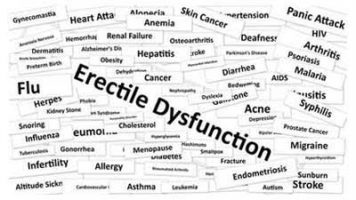- Home
- Editorial
- News
- Practice Guidelines
- Anesthesiology Guidelines
- Cancer Guidelines
- Cardiac Sciences Guidelines
- Critical Care Guidelines
- Dentistry Guidelines
- Dermatology Guidelines
- Diabetes and Endo Guidelines
- Diagnostics Guidelines
- ENT Guidelines
- Featured Practice Guidelines
- Gastroenterology Guidelines
- Geriatrics Guidelines
- Medicine Guidelines
- Nephrology Guidelines
- Neurosciences Guidelines
- Obs and Gynae Guidelines
- Ophthalmology Guidelines
- Orthopaedics Guidelines
- Paediatrics Guidelines
- Psychiatry Guidelines
- Pulmonology Guidelines
- Radiology Guidelines
- Surgery Guidelines
- Urology Guidelines
Study finds impotence has a genetic basis

In a new study, scientists have reportedly uncovered the first evidence that erectile dysfunction or impotence may have a genetic basis. The study has been published in the journal Proceedings of the National Academy of Sciences.
Erectile dysfunction (ED), also known as impotence, is the persistent inability to have an erection that is sufficient for sexual activity. It is a common and costly condition of men of primarily middle and older ages and is linked to many causes, such as neurological, hormonal and vascular factors. Genetics also is suspected as a factor in about one-third of erectile dysfunction cases, but researchers have failed to make an association with any specific genomic locations until now.
In the instant study, the researchers analyzed data from hundreds of thousands of men. They have found that variations in a specific place in the genome -- called a genetic locus -- near the SIM1 gene are significantly associated with an increased risk of erectile dysfunction or impotence.
The researchers conducted a genome-wide association study in two large and diverse cohorts to investigate genetic contributors to the risk of erectile dysfunction.
The GERA cohort included male members of Kaiser Permanente who completed a survey on their condition, had a clinical diagnosis of erectile dysfunction based on their electronic health records, and had used drugs or other erectile dysfunction treatments. The findings in the GERA cohort were then verified in a cohort of 222,358 men from the U.K. Biobank.
The study found that variations in the SIM1 locus were associated with a 26 percent increased risk of erectile dysfunction. This risk was independent of known erectile dysfunction risk factors. The association was replicated in the U.K. Biobank sample, providing strong confirmation of the findings.
"Identifying this SIM1 locus as a risk factor for erectile dysfunction is a big deal because it provides the long sought-after proof that there is a genetic component to the disease," said study author Eric Jorgenson. He's a research scientist at Kaiser Permanente Northern California's division of research.
"Identifying the first genetic risk factor for erectile dysfunction is an exciting discovery because it opens the door for investigations into new, genetic-based therapies," he added in a Kaiser news release.
According to study co-author Dr. Hunter Wessells, "This study points to a new research direction for erectile dysfunction that could help us identify other key genetic variants that trigger the disease and lead to investigations to better understand the precise mechanisms by which they operate." Wessells is chair of urology at the University of Washington School of Medicine.
"Hopefully, this will translate into better treatments and, importantly, prevention approaches for the men and their partners who often suffer silently with this condition," he added.
For further reference log on to https://doi.org/10.1073/pnas.1809872115

Disclaimer: This site is primarily intended for healthcare professionals. Any content/information on this website does not replace the advice of medical and/or health professionals and should not be construed as medical/diagnostic advice/endorsement or prescription. Use of this site is subject to our terms of use, privacy policy, advertisement policy. © 2020 Minerva Medical Treatment Pvt Ltd